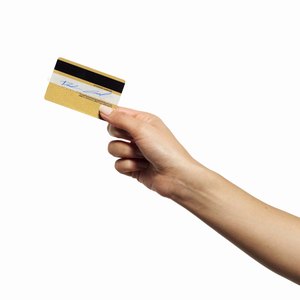
When you buy goods over the Internet, you don't sign a credit card receipt -- and the payment still gets charged. That's because the payment is processed when you enter the card's details at the online checkout, not when you physically sign a receipt. The bricks-and-mortar equivalent happens when the cashier swipes your card. If you forget to sign your receipt, your purchase still appears on your credit card bill. In fact, you likely won't notice a difference -- though the merchant might.
No Hard and Fast Rules
When you pay by credit card, some retailers require you to sign a receipt and others do not. There are no hard and fast rules. Generally, merchants are free to set their own policy, in conjunction with the credit card companies. Those that have a large volume of low value transactions may forgo a signature to keep the line moving. Others may ask for a signature -- and compare it to the signature on the back of your card -- every time you make a purchase, no matter how small the dollar value.
Signature Safeguards Against Fraud
Signatures are required to prevent fraud. Your signature on a credit card receipt authorizes the payment; it follows that if you don't sign, you can later claim that you didn’t authorize the charge. If you win your claim, the bank that issued the credit card is liable for the payment. Banks typically pass fraud costs onto the merchant, which means that a merchant who fails to follow certain anti-fraud protocols, such as asking you to sign, literally pays the price. Merchants that regularly take fraud risks typically pay higher fees to the credit company.
Challenging the Payment
Historically, when a payment dispute arose, the credit card company needed your signature on a receipt to prove that you authorized the charge. These days, consumers who challenge a charge they actually make are unlikely to get very far. Even if the merchant cannot pull up your signature, security video will likely show your purchase. If your card has a payment chip, you transaction is automatically logged whether you sign or not. Payment chips are projected to become standard in the United States by 2015.
Small Value Means No Signature
If your groceries cost less than $50 and you pay with Visa or MasterCard, the grocery store does not require you to sign. Both companies allow certain retailers, including grocery stores, to omit the signature for small purchases without being liable for subsequent fraud charges. American Express and Discover offer similar no-signature programs for transactions below $25. (Reference 3)
References
Writer Bio
Jayne Thompson earned an LLB in Law and Business Administration from the University of Birmingham and an LLM in International Law from the University of East London. She practiced in various “big law” firms before launching a career as a commercial writer specializing in finance and tech. Her work has appeared on numerous financial blogs including Wealth Soup and Synchrony. Find her at www.whiterosecopywriting.com.
